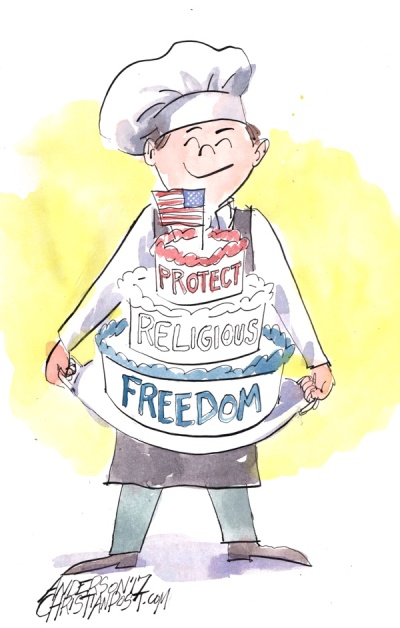Popular arguments against religious liberty, and how to respond (part 2)

A previous article reviewed important cases to date and their results in the conflict between religious liberty and the sexual revolution. This article will assess the basic argument made against religious liberty and how Christians can respond to it, regardless of how successful it proves to be in the courts.
The legal power of the Left comes from dominating the American establishment: the academy, the entertainment industry, the “mainstream” news media, and now large corporations. But it also gets great rhetorical power from the claim to victimhood. In the case of sexual orientation and gender identity (SOGI) requirements against religious liberty, it is in the use of the magic word “discrimination” to the general public, and in the legal world, the concept of the “third party harm” of religious freedom. This is mainly a matter of hurt feelings, although the enemies of conscience sometimes do claim inconvenience as a reason why people must be required to take actions they believe are evil. But principally it is hurt feelings are cast in the legal term “dignitary harm.” This argument was well laid out in a Yale Law Journal article in 2015.
“The exercise of your religion hurts me,” or “you’re imposing your views” goes this argument. Here the Left proceeds from the infamous Griswold vs. Connecticut decision (1965), which rather brazenly appealed to a law above the Bill of Rights, and has been developed to mean that there can be no adverse public judgment about private sexual behavior. Since sexual orientation and gender identity have been specified as antidiscrimination categories, courts hold not only LGBT identifying persons, but their sexual behavior as well is protected from adverse private judgment (discrimination). Thus there can be no “status/conduct distinction” courts say, in lawsuits brought on the basis of SOGI laws, although the laws themselves mention only persons. And thus the appeals of Huguenin, Stutzman, and others that they are perfectly willing to serve LGBT identifying persons, but not facilitate their behavior, turn out to be futile.
One has to wonder if this “status = conduct” equation should fail, even under Smith decision jurisprudence, since the real conflict between religious and LGBT claims is religious doctrine. Since most major world religions have condemned homosexuality from antiquity, and religious opposition has been and is the principle opposition to movement to normalize homosexuality, the use of SOGI laws could be understood as principally targeting religious doctrine. The use of “testers” sent to businesses to determine if proprietors will provide goods and services that involve complicity in homosexuality could support the claim that it is principally religious doctrine which is targeted. Similarly, the City of Philadelphia clearly targeted religious social services providing foster care according to religious precepts.
Of course if the Smith decision were ever overruled, courts could weigh religious against sexual claims. Perhaps it will eventually be overruled, but what is of interest here are the moral claims of LGBT liberation. This is the true issue behind the legal problems.
The “dignitary harm” argument against religious freedom, such as that made in the Yale Law Review article cited above involves two assumptions: 1) People may properly be required to take actions they understand to be sinful or evil, 2) they should be required to do this because others are pained, humiliated, and demeaned.
Both of these claims are repugnant to an ordinary sense of justice. On the first point, it is simply absolutely wrong to take action believed to be evil. This is known by common sense, and people at any time and place should understand it. The state thus should never require such action. On this point, new natural law philosopher Christopher Tollfesen has argued for an absolute right of conscience against actions believed to be evil.
On the second point, the faulty assumption is that people are not only humiliated, but also demeaned by encountering the claim that they are sinners. The subtle shift in the argument made to the courts and the public is from “all human beings have dignity,” to “homosexual and transgender identifying people have dignity in the life they lead.” Of course everyone has dignity (although one wonders what the real secular basis of this is), but we have dignity as human beings, not because of the life we have chosen to lead. Think of the chaos that would ensue if all persons were thought to have dignity because of the life they chose to lead and there could be no condemnation or punishment of their behavior.
For the state to assume that religious conscience objection is “harm” is really to maintain that religious doctrine is wrong. If the state takes no position on whether people are sinners, it should be indifferent to an individual’s pain at hearing that he or she is a sinner, or being treated as a sinner. Or if the state is not indifferent, there is also the indignity of being told one’s religious and moral commitments are ignorant, prejudiced, or cruel, or even having one’s God attacked as cruel and oppressive, all of which happen in this day of sexual liberation and militant secularism. And beyond that, the realistic material harm of attacks on one’s business or loss of business in a highly publicized case.
It is certainly true that an accusation, particularly a strong accusation of the kind traditional religions direct against homosexuality, produces stigma, pain, and humiliation. Accusations in general are painful. It is not the function of the state to guarantee peace of mind, nor does civil rights law, with its objective of removing stigma, override the Bill of Rights. Statutory law cannot override constitutional law.
It may be that while religious and social conservatives are dissatisfied with the seeming hesitancy of the court in its efforts to defend religious freedom, and the court’s focus on “animus” is inadequate protection for religious freedom, the focus on animus does address the targeting of religious freedom by partisans of the sexual revolution. Jack Phillips’ religious beliefs were and are being clearly targeted. Similarly the Obama Administration targeted the beliefs of the religious groups to whom it denied exemption, while giving exemptions to large secular organizations. Less obviously, the City of Philadelphia violated the free exercise rights of Catholic Social Services by not giving an exemption to its SOGI requirements when it might have. Barronelle Stutzman does not seem to have been targeted (in the original encounter with the LGBT customer), although the Washington State attorney general and ACLU went out of their way to sue her.
Ruling that the targeting of religious persons and organizations to require violation of religious precepts violates the free exercise of religion (as is being done with Jack Phillips, and seems to have been done with Catholic Social Services) would be an important step forward in the battle for religious freedom. But ultimately the court needs to rule that people cannot be required to express things they believe are false (e.g., artistic expression for sale and the use of preferred pronouns). This is a free speech argument. Also they must not be required to violate the precepts of their faith (e.g., participate in or assist in abortions, dispense abortifacient drugs, or include people in organizations who don’t agree with the organization’s religious beliefs or goals) This is a free exercise argument.
A large part of the nation has been trained, both by education and popular culture, to think that Christian doctrine and morality is wrong, and not only want to be free from it (which to a large degree they are), but also free from any possible effect it might have on their lives. This is clearly a claim to privilege. No one should have the right not to be offended, even when it is cloaked in the pretentious term of “dignitary harm.”
What the future holds is of course unknowable. We may or may not be successful in the legal struggle. But our duty to love God and neighbor never changes, in whatever regime we live under. Whatever the law of the state requires, our superior duty to God can never allow us to be complicit in sin.
Originally published at Juicy Ecumenism



























